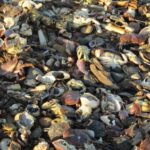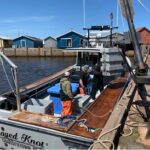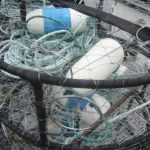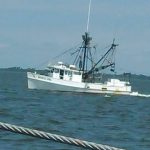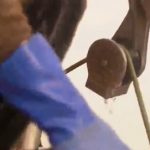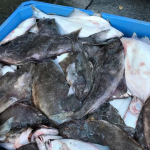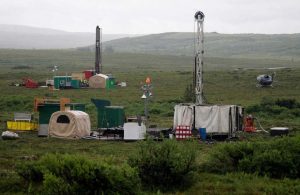Tag Archives: Gulf of St. Lawrence
Coast Guard ship fined for going too fast in Gulf of St. Lawrence.
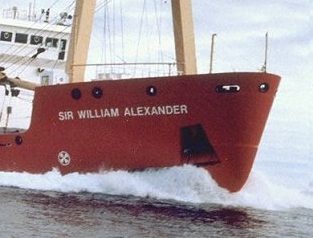 Transport Canada has fined the Canadian Coast Guard Ship Sir William Alexander $6,000 for going too fast in the Gulf of St. Lawrence. The ship allegedly violated the federal government’s 10-knot speed limit that was put in place in August to prevent further deaths of the endangered North Atlantic right whales. As of Sept. 16, there’s been 11 right whales confirmed dead in the Gulf. “We take the speed restriction very seriously,” Delphine Denis, a spokesperson for the federal Minister of Transport, said in an email. click here to read the story 16:41
Transport Canada has fined the Canadian Coast Guard Ship Sir William Alexander $6,000 for going too fast in the Gulf of St. Lawrence. The ship allegedly violated the federal government’s 10-knot speed limit that was put in place in August to prevent further deaths of the endangered North Atlantic right whales. As of Sept. 16, there’s been 11 right whales confirmed dead in the Gulf. “We take the speed restriction very seriously,” Delphine Denis, a spokesperson for the federal Minister of Transport, said in an email. click here to read the story 16:41
Carcass of a North Atlantic right whale spotted in the Gulf of St. Lawrence – click here to read the story
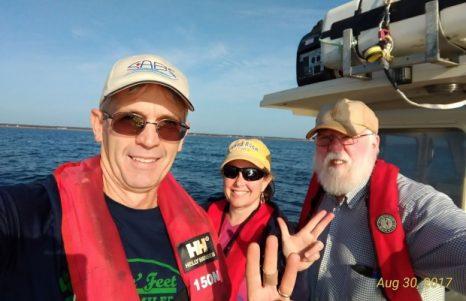
Scientists find Bluefin tuna quick to swim away after catch and release
Early results of a new study show catch and release has little impact on tuna. Gary Melvin, a research scientist with Fisheries and Oceans Canada, and a team of researchers are catching, tagging, releasing and tracking the mortality and movements of bluefin tuna throughout the Gulf of St. Lawrence. Last week, the research team was tagging tuna off of Tignish, P.E.I. “It’s always the big question when you hook a fish and they fight, what happens? And it’s common thought that they recover and swim away,” Melvin said. click here to read the story 10:21
Statement by Ministers Garneau and LeBlanc on actions taken to address the deaths of whales in the Gulf of St. Lawrence
 “In our efforts to do everything possible to prevent further whale deaths, our government is today implementing a temporary mandatory slow down for vessels of 20 metres or more in length. Speed must be reduced to a maximum of 10 knots when travelling in the western Gulf of St. Lawrence from the Quebec north shore to just north of Prince Edward Island. This temporary measure is effective immediately. ,, “We have taken extensive action to ensure the protection of North Atlantic right whales in the Gulf of St. Lawrence, including decisions around fisheries. click here to read the press release 08:59
“In our efforts to do everything possible to prevent further whale deaths, our government is today implementing a temporary mandatory slow down for vessels of 20 metres or more in length. Speed must be reduced to a maximum of 10 knots when travelling in the western Gulf of St. Lawrence from the Quebec north shore to just north of Prince Edward Island. This temporary measure is effective immediately. ,, “We have taken extensive action to ensure the protection of North Atlantic right whales in the Gulf of St. Lawrence, including decisions around fisheries. click here to read the press release 08:59
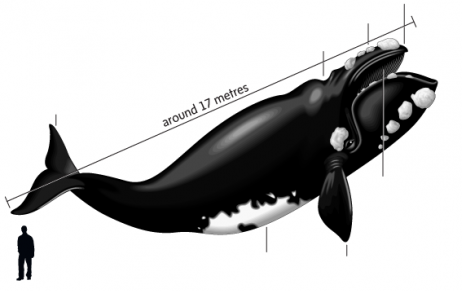
Why are whales dying in the Gulf of St. Lawrence? What it means for fisheries and the future
It was about four years ago when the sightings first began. In the beginning, just a few fishermen reported seeing large black whales in the Gulf of St. Lawrence, in areas clustered off the coast of Cape Breton Island. With each summer came more sightings. One was seen off the north coast of PEI. Another off of Pleasant Bay at Cape Breton Highlands National Park. A couple off of Southside Antigonish Harbour. Soon, the reports were in the dozens. The sightings were initially treated as a passing curiosity. The North Atlantic right whale, a rare and endangered species distinguished by patches of roughened white skin, had been seen off the coast of the Gaspé in Quebec before – though few could recall ever seeing them in this part of the gulf. But then came the deaths. That’s when everyone started paying attention – especially the fishermen. click here to read the story 14:47
Shrinking northern shrimp catch sparks worry for one of Eastern Canada’s most important fisheries
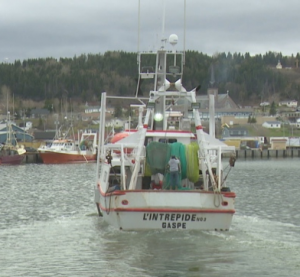 The northern shrimp population in the Gulf of St. Lawrence has dropped by 50 per cent in the past 10 years, according to Fisheries and Oceans Canada. Commercial fishermen brought in roughly 30 per cent fewer shrimp between 2015 and 2016. While the exact portrait of what is happening with shrimp stocks may be complex, the warming temperatures of the Gulf of St. Lawrence have been fingered as a potential problem for northern shrimp, a cold-water-loving shrimp species found in the northwest Atlantic. Another factor is the increasing number of redfish, also known as the ocean perch, a species that prefers warmer temperatures. Redfish compete with the shrimp for food when they are young, and feed on them when they are older. click here to read the story 11:08
The northern shrimp population in the Gulf of St. Lawrence has dropped by 50 per cent in the past 10 years, according to Fisheries and Oceans Canada. Commercial fishermen brought in roughly 30 per cent fewer shrimp between 2015 and 2016. While the exact portrait of what is happening with shrimp stocks may be complex, the warming temperatures of the Gulf of St. Lawrence have been fingered as a potential problem for northern shrimp, a cold-water-loving shrimp species found in the northwest Atlantic. Another factor is the increasing number of redfish, also known as the ocean perch, a species that prefers warmer temperatures. Redfish compete with the shrimp for food when they are young, and feed on them when they are older. click here to read the story 11:08
Today’s Whale News. 8th right whale found dead, 1 more entangled, whale rescues resume, young Humback detangled of Cali.
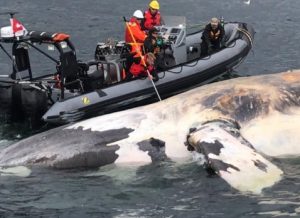 An eighth North Atlantic right whale has been found dead and another is entangled in fishing gear in the Gulf of St. Lawrence, the Marine Animal Response Society said in a Facebook post.
An eighth North Atlantic right whale has been found dead and another is entangled in fishing gear in the Gulf of St. Lawrence, the Marine Animal Response Society said in a Facebook post.
All eight deaths have occurred in the gulf since the beginning of June, which experts are calling an “unprecedented event.” click here to read the story
U.S. officials are lifting a ban on some whale disentanglement efforts after briefly banning the practice that last week led to the death of a Canadian fisherman. But the ban will stay in effect for right whales, “whose unpredictable behavior is particularly challenging during rescue attempts,” Chris Oliver, Assistant Administrator for NOAA Fisheries, said Tuesday. click here to read the story
A crew of 20-25 people spent eight hours Tuesday freeing a juvenile humpback whale that had been entangled in fishing gear off the coast of Crescent City since Thursday. click here to read the story 11:30
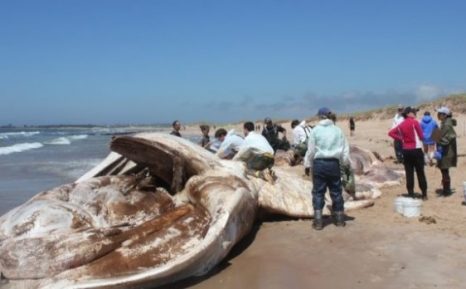
Evidence from latest right whale necropsy points to collision with ship
Preliminary results from necropsies performed on two North Atlantic right whales on the Magdalen Islands this week suggest one of them was involved in a collision with a ship. The other whale was too decomposed and determining a cause of death was not possible. The carcasses of seven right whales have been found in the Gulf of St. Lawrence since June 6. Necropies performed on two of the other dead whales at the start of July also found evidence of collisions with ships. Another carcass showed evidence of a “chronic entanglement.” Josiane Cabana of Quebec’s marine mammal rescue network told CBC’s French-language service, Radio-Canada, that scientists have not ruled out toxic algae as a contributing factor in the deaths. click here to read the story 09:57
DFO closes a gulf fishery early to help protect right whales
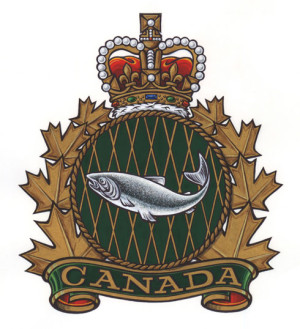 Fisheries and Oceans Canada closed part of the snow crab fishery two days early on Wednesday as part of efforts to save the remaining population of North Atlantic right whales. The department announced several steps to protect the whales two days after the death of Joe Howlett, who was killed Monday after freeing a North Atlantic right whale that had been entangled in fishing gear in the Gulf of St. Lawrence near Shippagan, N.B.,,, DFO said it will review fisheries in the area of the gulf where right whales have been showing up in greater numbers, with some encountering danger. click here to read the story 09:33
Fisheries and Oceans Canada closed part of the snow crab fishery two days early on Wednesday as part of efforts to save the remaining population of North Atlantic right whales. The department announced several steps to protect the whales two days after the death of Joe Howlett, who was killed Monday after freeing a North Atlantic right whale that had been entangled in fishing gear in the Gulf of St. Lawrence near Shippagan, N.B.,,, DFO said it will review fisheries in the area of the gulf where right whales have been showing up in greater numbers, with some encountering danger. click here to read the story 09:33
Baby lobster abundance suggests strong harvests will continue
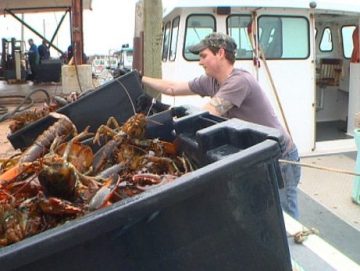 Lobster fishermen and government officials are seeing indications are that lobster stocks will be plentiful in the Gulf of St. Lawrence for the next few years at least. Fishermen have been reporting a lot of smaller lobsters in their traps this year, which Fisheries and Oceans Canada preliminary monitoring has confirmed. Amelie Rondeau of Fisheries and Oceans said the abundance of lobsters has been building in the last five years, with lobster landings going up as well. “All the stars are aligned: favourable environmental conditions, combined with proper management of the stocks,” said Rondeau. click here to read the story 14:01
Lobster fishermen and government officials are seeing indications are that lobster stocks will be plentiful in the Gulf of St. Lawrence for the next few years at least. Fishermen have been reporting a lot of smaller lobsters in their traps this year, which Fisheries and Oceans Canada preliminary monitoring has confirmed. Amelie Rondeau of Fisheries and Oceans said the abundance of lobsters has been building in the last five years, with lobster landings going up as well. “All the stars are aligned: favourable environmental conditions, combined with proper management of the stocks,” said Rondeau. click here to read the story 14:01
7th right whale found dead in Gulf of St. Lawrence
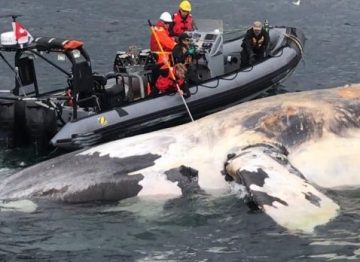 The carcass of a seventh North Atlantic right whale has been found off the Magdalen Islands in the Gulf of St. Lawrence, reports Radio-Canada. The Canadian Coast Guard discovered the dead whale near Havre-Aubert on Wednesday night. Quebec’s marine mammal research network, known by its French initials GREMM, confirmed to CBC’s French-language service that it was not previously aware of the carcass. Tonya Wimmer, with the Marine Animal Response Society, said the whale is a male, and it was badly decomposed. She also said it isn’t clear yet what caused the whale’s death, The Canadian Press reported. click here to read the story 13:06
The carcass of a seventh North Atlantic right whale has been found off the Magdalen Islands in the Gulf of St. Lawrence, reports Radio-Canada. The Canadian Coast Guard discovered the dead whale near Havre-Aubert on Wednesday night. Quebec’s marine mammal research network, known by its French initials GREMM, confirmed to CBC’s French-language service that it was not previously aware of the carcass. Tonya Wimmer, with the Marine Animal Response Society, said the whale is a male, and it was badly decomposed. She also said it isn’t clear yet what caused the whale’s death, The Canadian Press reported. click here to read the story 13:06
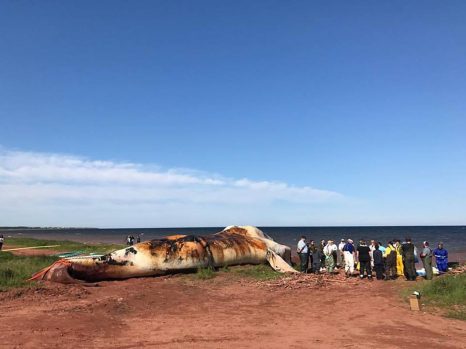
Preliminary findings of necropsies -Two whales suffered blunt trauma, another killed by fishing gear
Injuries suffered by at least two of six North Atlantic right whales found floating lifeless in the Gulf of St. Lawrence appear to be consistent with ship strikes, marine mammal experts say. Tonya Wimmer of the Marine Animal Response Society said Tuesday that the preliminary findings of necropsies on three of the whales indicate that two of them sustained blunt traumas that caused extensive bruising along their sides and internal hemorrhaging. A third died after becoming snarled in fishing rope that wrapped around one flipper and inside its mouth. click here to read the story ,,,, Whale deaths raise concern – The first dead whale spotted on June 6 was a 10-year-old male who was last seen in Cape Cod Bay on April 23 by the Center for Coastal Studies. The elapsed time between those sightings was only about six weeks. The other identified dead whales included two adult males, at least 17 and 37 years old, and a highly valuable 11-year-old female. Through DNA analysis, two of the males were known to have sired calves. The two remaining unidentified whales were a male and a female. click here to read the story 14:11
Think you’ve seen it all? Trudeau government proposes opening St. Lawrence marine protected area to oil exploration
 The Liberal government is proposing to allow oil and gas exploration in a new marine protected area that it plans to establish where the Gulf of St. Lawrence meets the Atlantic Ocean. Ottawa released an impact statement Friday on its Laurentian Channel protected area, a 11,619-square-kilometre stretch of ocean in which commercial activity would be limited in order to protect vulnerable marine life. The establishment of the marine protected area (MPA) is part of Prime Minister Justin Trudeau’s promise to set aside 10 per cent of Canada’s coastal waters by 2020. But some environmental groups and ocean scientists argue Ottawa is undermining the effort by allowing future oil and gas exploration in the zone. click here to read the story 19:57
The Liberal government is proposing to allow oil and gas exploration in a new marine protected area that it plans to establish where the Gulf of St. Lawrence meets the Atlantic Ocean. Ottawa released an impact statement Friday on its Laurentian Channel protected area, a 11,619-square-kilometre stretch of ocean in which commercial activity would be limited in order to protect vulnerable marine life. The establishment of the marine protected area (MPA) is part of Prime Minister Justin Trudeau’s promise to set aside 10 per cent of Canada’s coastal waters by 2020. But some environmental groups and ocean scientists argue Ottawa is undermining the effort by allowing future oil and gas exploration in the zone. click here to read the story 19:57
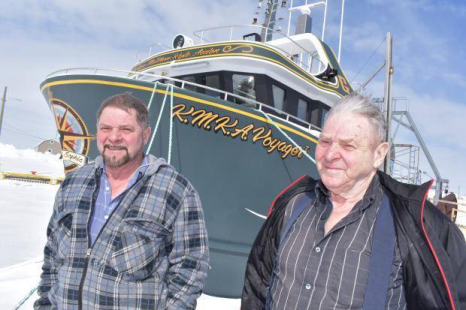
The cod are coming back to Newfoundland — and they’re eating the shrimp that had taken over
Theodore Genge has a big beautiful new dragger that’ll be ready to head for “the Labrador” as soon as the sea ice loosens its grip on Anchor Point. When the 63-year-old Newfoundland fisherman began building the $2.2 million trawler two years ago he had 750,000 pounds worth of shrimp quota to catch. But plummeting shrimp numbers in the cold water off Labrador have led Fisheries and Oceans Canada to drastically carve into quotas for that coast. Genge expects that by April he’ll be left with a total of 300,000 lbs of quotas — 220,000 lbs in the Gulf of St. Lawrence, where there is still plenty of shrimp, and 80,000 lbs on the Labrador coast. “Right now, yes, it’s pretty stressful – I don’t know whether there’s any hope or no,” said Genge. (Big read!) continue reading the article here 16:25
Herring stock falling to critical level say scientists at Fisheries and Oceans Canada
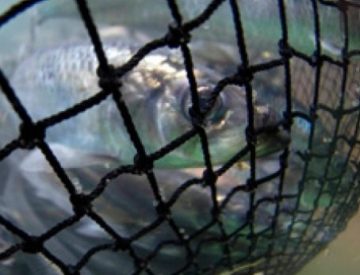 Even if there was a two-year hiatus in the spring herring fishery in the Gulf of St Lawrence, there would still be a 90 per cent chance the fish stocks would remain at critical levels, say scientists at Fisheries and Oceans Canada. Herring stocks have been dwindling for two decades. Despite the advice of its own scientists, Fisheries and Oceans Canada still allowed 2,000 tonnes of spring herring to be caught in 2016, and will allow the same this year. Federal herring biologist Jenni McDermid said there is a risk of pushing these fish beyond the recovery point. Read the story here 11:33
Even if there was a two-year hiatus in the spring herring fishery in the Gulf of St Lawrence, there would still be a 90 per cent chance the fish stocks would remain at critical levels, say scientists at Fisheries and Oceans Canada. Herring stocks have been dwindling for two decades. Despite the advice of its own scientists, Fisheries and Oceans Canada still allowed 2,000 tonnes of spring herring to be caught in 2016, and will allow the same this year. Federal herring biologist Jenni McDermid said there is a risk of pushing these fish beyond the recovery point. Read the story here 11:33
Warming trend continues in waters off Atlantic Canada
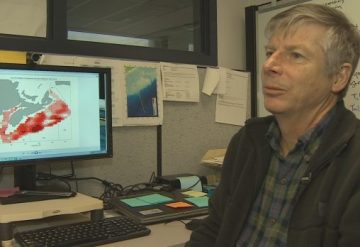 Warmer ocean temperatures off Atlantic Canada continued in 2016, maintaining a trend that started earlier this decade, according to survey results from Canada’s Department of Fisheries and Oceans. On the Scotian Shelf off Nova Scotia, temperatures last year were as high as three degrees above the 30-year average used to establish climatic norms. “It’s not quite the same [record] level of 2012, but it’s getting close to it,” said Dave Hebert, a research scientist with DFO. He added that 2016 was probably the second warmest year on record. Scientists have struggled to explain what is causing the most intriguing aspect of the recent trend: the warming of ocean bottom water, which is not influenced by surface weather events. Hebert said the latest theory is based on model results that see the Gulf Stream moving northward and intersecting with the tail of the Grand Banks. “That is stopping the cold Labrador Sea water from coming around the tail of the Grand Banks,” he said. “That’s where we normally get the cold water that refreshes the [Scotian] Shelf. That hasn’t been happening. Read the story here 16:48
Warmer ocean temperatures off Atlantic Canada continued in 2016, maintaining a trend that started earlier this decade, according to survey results from Canada’s Department of Fisheries and Oceans. On the Scotian Shelf off Nova Scotia, temperatures last year were as high as three degrees above the 30-year average used to establish climatic norms. “It’s not quite the same [record] level of 2012, but it’s getting close to it,” said Dave Hebert, a research scientist with DFO. He added that 2016 was probably the second warmest year on record. Scientists have struggled to explain what is causing the most intriguing aspect of the recent trend: the warming of ocean bottom water, which is not influenced by surface weather events. Hebert said the latest theory is based on model results that see the Gulf Stream moving northward and intersecting with the tail of the Grand Banks. “That is stopping the cold Labrador Sea water from coming around the tail of the Grand Banks,” he said. “That’s where we normally get the cold water that refreshes the [Scotian] Shelf. That hasn’t been happening. Read the story here 16:48
Lobster fisherman wary of Gulf of St. Lawrence oil drilling
 As lobster season gets underway Tuesday in Cape Breton, a top local fisherman is warning that oil exploration and drilling in the Gulf of St. Lawrence could wreak havoc on local marine life. “It could ruin our industry,” said Jordan MacDougall, president of the Inverness South Fisherman’s Association. He warned that any oil spill would settle on the seabed — prime lobster habitat — and devastate their populations. “You wouldn’t be able to sell your product and it would probably give Canada a negative name for that product from other areas,” said MacDougall. His comments come just four months after regulators granted a one-year extension on an oil exploration licence for Corridor Resources Inc. at the Old Harry site off the western coast of Newfoundland, in the Gulf of Saint Lawrence. Read the story here 18:19
As lobster season gets underway Tuesday in Cape Breton, a top local fisherman is warning that oil exploration and drilling in the Gulf of St. Lawrence could wreak havoc on local marine life. “It could ruin our industry,” said Jordan MacDougall, president of the Inverness South Fisherman’s Association. He warned that any oil spill would settle on the seabed — prime lobster habitat — and devastate their populations. “You wouldn’t be able to sell your product and it would probably give Canada a negative name for that product from other areas,” said MacDougall. His comments come just four months after regulators granted a one-year extension on an oil exploration licence for Corridor Resources Inc. at the Old Harry site off the western coast of Newfoundland, in the Gulf of Saint Lawrence. Read the story here 18:19
Just for the Halibut – Quota in the Gulf of St. Lawrence
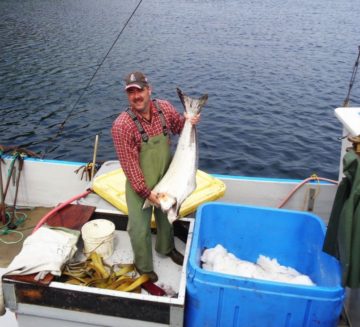 While most attention these days is focused on who should should get how much of a share of northern shrimp, the Department of Fisheries and Oceans is trying to decide how the Atlantic halibut quota in the Gulf should be shared between fishermen in the five Atlantic provinces. These days, fishermen who ply the waters in the Gulf of St. Lawrence, fetch anywhere from $6 to $7 a pound for halibut they catch on hook and line. The quota in the Gulf of St. Lawrence is limited — just over 800 tonnes for the past two fishing seasons — and is shared up between five provinces. Read the rest here 08:58
While most attention these days is focused on who should should get how much of a share of northern shrimp, the Department of Fisheries and Oceans is trying to decide how the Atlantic halibut quota in the Gulf should be shared between fishermen in the five Atlantic provinces. These days, fishermen who ply the waters in the Gulf of St. Lawrence, fetch anywhere from $6 to $7 a pound for halibut they catch on hook and line. The quota in the Gulf of St. Lawrence is limited — just over 800 tonnes for the past two fishing seasons — and is shared up between five provinces. Read the rest here 08:58
Victoria Co. snow crab fishermen could be hit hardest by quota cuts
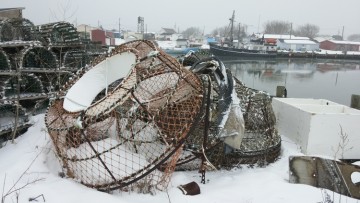 Snow crab fishermen in the waters off Cape Breton are preparing for a leaner season this year, with quota cuts approved or proposed in both the Gulf of St. Lawrence and the Atlantic Ocean. While most fishermen know the fishery is cyclical and they need to take fewer crab when the stock is low, those in Crab Fishing Areas 20 to 22 – which covers the Atlantic side of the island, along the Cabot Trail from Glace Bay to Bay St. Lawrence – are facing a steep cut that could be as high as 45 per cent. What’s more, the subsea cable for the Maritime Link,, Read the article here 17:14
Snow crab fishermen in the waters off Cape Breton are preparing for a leaner season this year, with quota cuts approved or proposed in both the Gulf of St. Lawrence and the Atlantic Ocean. While most fishermen know the fishery is cyclical and they need to take fewer crab when the stock is low, those in Crab Fishing Areas 20 to 22 – which covers the Atlantic side of the island, along the Cabot Trail from Glace Bay to Bay St. Lawrence – are facing a steep cut that could be as high as 45 per cent. What’s more, the subsea cable for the Maritime Link,, Read the article here 17:14
P.E.I. Fishermen’s Association concerned about Gulf of St. Lawrence oil exploration
 The executive director of the P.E.I. Fishermen’s Association is calling on the federal government to better assess the risks of oil exploration in the Gulf of St. Lawrence. Ian MacPherson wants Ottawa to study the potential impact of an oil spill on the seafood industry. Halifax-based Corridor Resources has applied to do exploratory drilling in the Old Harry reserve between the Magdalen Islands and Newfoundland. Read the rest here 10:01
The executive director of the P.E.I. Fishermen’s Association is calling on the federal government to better assess the risks of oil exploration in the Gulf of St. Lawrence. Ian MacPherson wants Ottawa to study the potential impact of an oil spill on the seafood industry. Halifax-based Corridor Resources has applied to do exploratory drilling in the Old Harry reserve between the Magdalen Islands and Newfoundland. Read the rest here 10:01
Drilling beneath Gulf of St. Lawrence could harm environment more than forecast, research says
![]() New warnings are being raised over proposed drilling at the Old Harry reservoir beneath the Gulf of St. Lawrence, with research that suggests an oil spill at the site could affect coastlines in Atlantic Canada. Read the rest here 08:39
New warnings are being raised over proposed drilling at the Old Harry reservoir beneath the Gulf of St. Lawrence, with research that suggests an oil spill at the site could affect coastlines in Atlantic Canada. Read the rest here 08:39
Groups call for Gulf of St. Lawrence oil and gas moratorium
![]() A coalition of fishermen, environmentalists and First Nations groups have joined forces to oppose oil and gas activity in the Gulf of St. Lawrence by calling for a moratorium. The groups want and independent review and public consultation on whether oil and gas activity should be allowed. They say, the Gulf ecosystem is too fragile. Read more here 12:52
A coalition of fishermen, environmentalists and First Nations groups have joined forces to oppose oil and gas activity in the Gulf of St. Lawrence by calling for a moratorium. The groups want and independent review and public consultation on whether oil and gas activity should be allowed. They say, the Gulf ecosystem is too fragile. Read more here 12:52
Hunt for oil, gas in Gulf of St. Lawrence questioned – “The way fishermen feel is government is going to walk over us anyway,”
The Ecology Action Centre in Halifax and fishermen in Cape Breton are raising the alarm over the possibility of oil and gas exploration in the Gulf of St. Lawrence. Joanne Cook, marine toxics co-ordinator at the centre, said the Canada-Newfoundland Offshore Petroleum Board announced this week it was approving oil and gas exploration in the gulf. Read more here 09:41
Fishermen are still at the mercy of Mother Nature
But fishermen today can take heart from the following story written by Frank Weeks and published in The Guardian May 29, 1961. “Lobster fishermen in Alberton and Tignish set their traps on 30 May 1961, possibly the latest date ever recorded for the spring season in,,,In his story, Weeks writes of some of the older fishermen who remember times when they had to fish lobster through the ice and special gear had to be used. “They say it has been 50 years since they were forced to fish lobsters through the ice. Back in the years around 1911, Read more here 23:27
DFO approves grey seal hunt in southern area of gulf
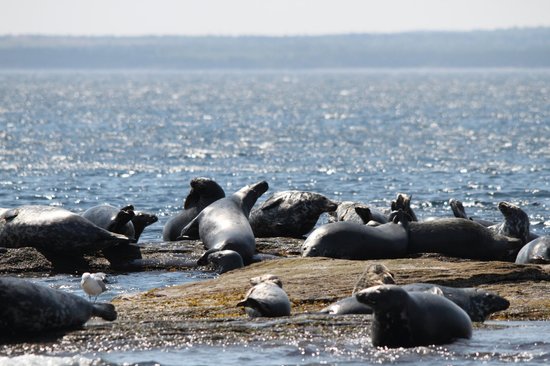 SYDNEY — The Department of Fisheries and Oceans has approved a grey seal hunt in the southernmost area of the Gulf of St. Lawrence, which includes the waters off western Cape Breton. Read more@capebretonpost 15:24
SYDNEY — The Department of Fisheries and Oceans has approved a grey seal hunt in the southernmost area of the Gulf of St. Lawrence, which includes the waters off western Cape Breton. Read more@capebretonpost 15:24
Gulf of St. Lawrence oil and gas plans draw opposition
 Seven P.E.I. municipalities have signed a resolution against oil and gas exploration in the Gulf of St. Lawrence. A group called the Save our Seas and Shores Coalition sent template resolutions to the province’s approximately 75 municipalities. It called for either a moratorium until a review or public consultation is carried out, or a moratorium leading to a ban. Read more@cbcnews 22:51
Seven P.E.I. municipalities have signed a resolution against oil and gas exploration in the Gulf of St. Lawrence. A group called the Save our Seas and Shores Coalition sent template resolutions to the province’s approximately 75 municipalities. It called for either a moratorium until a review or public consultation is carried out, or a moratorium leading to a ban. Read more@cbcnews 22:51
Canada Plan to cull 70,000 grey seals gets Senate panel’s approval.
The Senate’s fisheries committee has endorsed a contentious cull of 70,000 grey seals in the Gulf of St. Lawrence over a four-year period, in a bid to conserve cod stocks. But critics say that plans for a cull have been driven by politics, not science.
A group of marine biologists at Dalhousie University in Halifax issued an open letter last fall that said a cull could produce unintended consequences, including further depletion of the cod. (now THAT makes alotta sense!!!) One cannot credibly predict from a science perspective whether a cull of grey seals would have a positive impact on cod or negative impact on cod … or no impact whatsoever,” he said. (I’m thinkin’ outside the box. It’ll help the cod!)

































